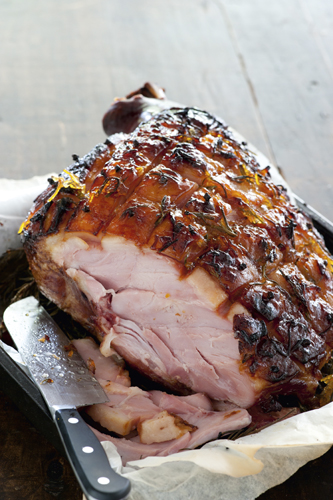A Feast for the Senses: Where to Buy Christmas Edibles, Pt 1
Mention roast chestnuts, a savory smoked ham, or the warming glow from a glass of mulled wine, and you’re bound to evoke Christmas memories any time of the year. Different countries have their own traditional festive foods, and many seasonal treats have thankfully traveled further than their country of origin. Luckily for us, many of these gourmet goodies can be savored right here in Beijing this Christmas.

Turkey and Ham
The practice of serving large, stuffed fowl for Christmas has been going on for centuries; peacocks, swans, geese, and turkeys all fit the bill at some point in history. Turkeys were introduced to Europe in the 16th century, but for many years, these “exotic” birds only graced the tables of the wealthy. Working-class English Victorian families like the Cratchits in Charles Dickens’ Christmas Carol would cook goose instead. In America, wild and plentiful turkey was the natural choice for a Christmas feast.
RELATED: A Feast for the Senses: Where to Buy Christmas Edibles, Pt 2
A Christmas or Yule ham is a traditional dish associated with the modern version of Christmas. The ham is cured and sometimes smoked, and is baked either in the oven or boiled. In Nordic countries, it is traditionally coated with a layer of mustard mixed with eggs, then breaded with breadcrumbs.
Where to buy? Beijing’s international supermarkets and butchers will have turkeys and hams for sale throughout December. Most turkeys will be imported and sold frozen. Prices for turkeys range from RMB 49-78 per kilo. Hams are sold boned or boneless, and prices vary according to the type of ham. Be sure to order any meats super early. The usual suspects include April Gourmet, Baode Home Delivery, BHG Market Place, Boucherie Michel, City Shop, Jenny Lou’s, Jenny Wang’s, Schindler’s Food Center, and TooToo Organic Farm.
Spiced Wine
Mulled wine is a beverage served hot or warm, usually made with red wine and various mulling spices such as cloves, nutmeg, and cinnamon or mace. Any kind of wine may be mulled, but port and claret were traditionally used in England.
Glühwein (“glow-wine,” from the hot irons once used for mulling) is popular in German-speaking countries. It’s prepared from red wine, heated and spiced with cinnamon sticks, cloves, star aniseed, citrus, and sugar.
A similar concoction among the Nordic countries is Norwegian and Danish gløgg, Swedish and Icelandic glögg, and Finnish glögi. The main ingredients are red wine, sugar, and spices such as cinnamon, cardamom, ginger, cloves, and bitter orange. It may also include the optional addition of stronger spirits such as vodka, akvavit, or brandy.
Where to buy? Ikea sells bottles of Swedish-style gløgg. Most international supermarkets sell all the spices you need for mulling wine yourself.
This article first appeared on beijingkids.
Photos: manuscriptcellars.com, rpavich (Flickr)







